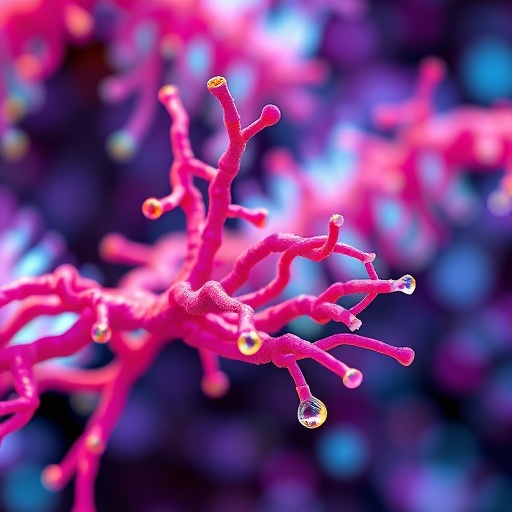In a groundbreaking study set to reshape our understanding of the skin microbiome and its relationship with dermatological health, researchers Orschanski, Dandeu, Rivero, and colleagues present innovative findings regarding the use of alignment-based de-hosting and bioinformatics pipelines in analyzing shotgun microbiome data. This research, published in the Journal of Translational Medicine, sheds light on the intricate connections between microbial communities and skin conditions, paving the way for future therapeutic strategies.
The skin, often seen merely as a protective barrier, is home to a vast array of microorganisms that constitute the skin microbiome. This diverse community of bacteria, fungi, and viruses plays a crucial role in maintaining skin health and homeostasis. Disruptions to this delicate balance can lead to various dermatological issues such as acne, eczema, and psoriasis. By understanding these microbial interactions through advanced bioinformatics methods, the team aims to develop better diagnostic and treatment protocols.
Key to this research is the concept of “alignment-based de-hosting,” which refers to the sophisticated process of isolating microbial DNA from the host’s genetic material. Traditional methods often struggle with the complexities of host-microbe coexistence, leading to ambiguous data and interpretations. The team’s approach uses advanced algorithms and bioinformatics tools to enhance the clarity and accuracy of microbiome analyses, thus providing a more precise picture of microbial diversity and its implications for skin health.
Furthermore, the shotgun sequencing technique employed by the researchers allows for an unprecedented level of detail regarding the microbial species present on the skin. Unlike targeted sequencing methods that focus on specific organisms, shotgun sequencing comprises a comprehensive analysis of the microbial community, capturing even the most elusive species. This holistic approach permits researchers to identify previously unrecognized members of the skin microbiome that may play critical roles in dermatological conditions.
In their findings, Orschanski and collaborators highlight the profound influence of environmental factors and lifestyle choices on the skin microbiome’s composition. From dietary habits to skincare routines, these factors can significantly alter the microbial landscape of the skin, potentially exacerbating or alleviating dermatological issues. This insight opens avenues for personalized skincare treatments that consider an individual’s unique microbiome profile.
The researchers also delve into the bioinformatics pipelines that process and interpret microbiome data. By leveraging machine learning algorithms and artificial intelligence, they enhance the predictive power of their analyses, enabling them to parse complex data sets quickly and efficiently. This not only accelerates the research process but also improves the reliability of the findings, making it easier for clinicians to apply this knowledge in practice.
One of the study’s remarkable conclusions is the identification of specific bacterial species that correlate with common skin disorders. Through their advanced methodologies and comprehensive data analysis, the team outlines potential microbial biomarkers associated with conditions like acne and dermatitis. These biomarkers could revolutionize diagnostic processes, allowing for faster and more accurate assessments of skin health and disease.
As the scientists explore the implications of these findings, they stress the importance of developing targeted therapies that restore the natural balance of the skin microbiome. Current treatments often take a one-size-fits-all approach, but the research underscores the need for individualized strategies that cater to the unique microbiome of each patient. Such tailored interventions could lead to more effective treatment outcomes and reduced side effects.
In the broader context of scientific inquiry, the study serves as a timely reminder of the importance of interdisciplinary collaboration. By integrating microbiology, dermatology, and computational biology, this research exemplifies how diverse fields can converge to address complex health issues. The collaboration among the researchers demonstrates the power of collective expertise in tackling the multifaceted nature of skin health.
Looking forward, the implications of this research extend beyond dermatology. The methodologies developed could potentially be applied to other areas of medicine, where microbial communities influence health outcomes. From gastrointestinal disorders to respiratory diseases, the study paves the way for further exploration of the role of microbiomes in various bodily systems.
The remarkable potential of alignment-based de-hosting and bioinformatics pipelines signifies a transformative shift in microbial research. As techniques continue to advance, future studies might uncover even deeper connections between microbial diversity and health, offering new insights and promising strategies for prevention and treatment.
In conclusion, the findings of Orschanski, Dandeu, Rivero, and their team represent a significant leap forward in our understanding of the skin microbiome. With the ongoing evolution of bioinformatics tools and methodologies, the possibility of harnessing these insights for clinical applications seems closer than ever. This transformative research not only enhances our grasp of dermatology but also sets the stage for a wider appreciation of the microbiome’s vital role in human health.
The revelations detailed in this study will undoubtedly spark fervent interest in the scientific community and beyond, encouraging dialogue and further investigation into the microscopic world that resides on our skin.
As the researchers continue to explore these fascinating dynamics, the anticipation grows for the next set of discoveries that could arise from this burgeoning field of study.
Subject of Research: Dermatological implications of the skin microbiome through advanced bioinformatics methods.
Article Title: Dermatological implications of alignment-based de-hosting and bioinformatics pipelines on shotgun microbiome analysis.
Article References:
Orschanski, D., Rubén Dandeu, L., Rivero, M. et al. Dermatological implications of alignment-based de-hosting and bioinformatics pipelines on shotgun microbiome analysis.
J Transl Med 23, 1276 (2025). https://doi.org/10.1186/s12967-025-07246-z
Image Credits: AI Generated
DOI: https://doi.org/10.1186/s12967-025-07246-z
Keywords: Skin microbiome, alignment-based de-hosting, bioinformatics, shotgun sequencing, dermatology, microbial balance, personalized treatment, health outcomes.
Tags: advanced bioinformatics pipelinesalignment-based de-hosting techniquesbioinformatics in microbiome analysisdermatological conditions and microbiomehost-microbe interactions in dermatologyinnovative diagnostic methods in microbiome studiesJournal of Translational Medicine researchmicrobial communities and skin healthshotgun sequencing of skin microbiomeskin microbiome research findingstherapeutic strategies for skin disordersunderstanding skin health through microbiome analysis





